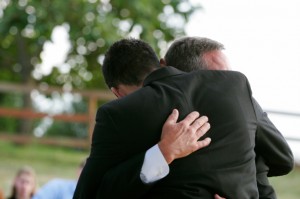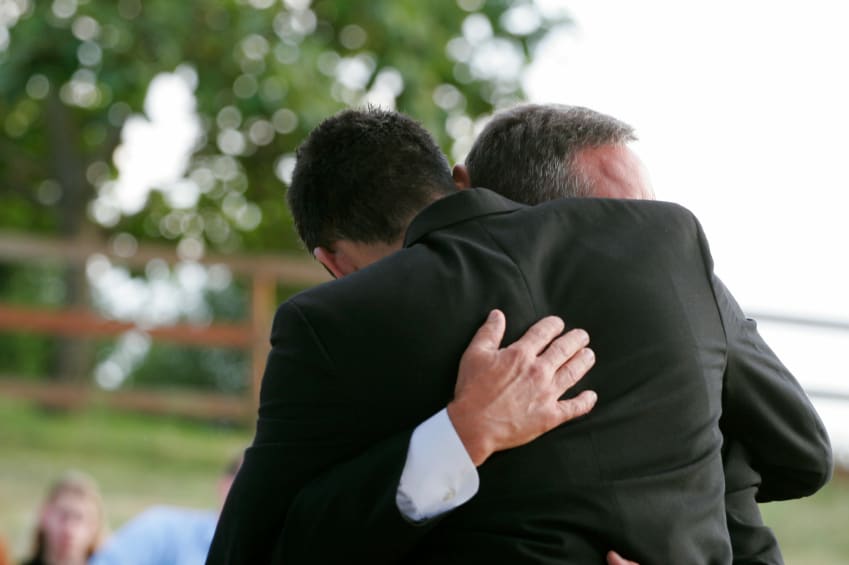Ever tell a child to apologize? Frequently, he or she would rather do almost anything else than ask for forgiveness.
As adults, it’s not much different.
Why?

Requesting forgiveness means admitting you were wrong. This is a blow to your ego, which thinks you never make mistakes. But you can shrink your ego down to size by increasing humility.
One way to enhance your humility is to tell yourself regularly that everything you are and have accomplished is due to the help of your Creator. Your successes and achievements come only from Him. He is your strength and with Him, you can do anything. Without Him, you can do nothing and would be totally helpless. For further guidance on cultivating humility, see the sections on humility in the classics, Duties of the Heart and The Path of the Just.
When you acknowledge your human frailty, you acquire the ability to recognize your inevitable mistakes. You can then immediately apologize and correct them.
There are numerous ways we can harm others: speaking negatively, saying hurtful things, mistreating them, causing financial harm or withholding items or monies due.
How do we know when we have wronged someone? Sadly, although the above list encompasses common behavior, many individuals do not realize they have committed them.
As discussed in a previous article, “The Freedom of Forgiveness: Five Strategies to Letting Go,” people frequently think they have done the right thing, even when they are grossly mistaken. As the saying goes, “The road to Hell is paved with good intentions.” A frightening thought – if we frequently do not realize we harmed someone, emotionally or financially, how can we be certain we are not walking on that road?
1) Be brutally honest. Ask, “What do I want more: to be right or to do right? Am I willing to admit I was wrong in order to do what is right?” When you are ready to do the right thing, your Creator’s will, at all costs and ask Him for assistance, He will help you achieve your goal.
2) Ask your rabbi. If someone has made a claim against you, financial or emotional, or if your conscience bothers you about an interaction, go to a rabbi well versed in Torah law and find out how the Torah guides one to act. If possible, invite the other party to present their side.
3) Learn the law. Study the Torah’s guidelines for interpersonal behavior. One resource is Rabbi Yitzchok Silver’s fascinating book, The Code of Jewish Conduct: The laws of interpersonal relationships. (You can subscribe to a free daily email version of this book at http://jvalues.ohrsites.com/subscribe.php.)
Another comprehensive work which complements Rabbi Silver’s book is Halachos of Other Peoples’ Money by Rabbi Yisroel Pinchos Bodner. The title is telling; a common error which leads many to violate the prohibition of stealing is the assumption that “I’m not a thief; the money in question is mine.” When discussing a situation with a knowledgeable rabbi we may discover, in more scenarios than we expect, that G-d says, “The money in question is not yours, it is other peoples’ money.” Consulting with rabbis and learning the laws will enable us to see life from a divine perspective and not from one clouded by bias and ignorance.
Quick Primer on Asking Forgiveness:
Motivate yourself: Asking someone for forgiveness requires sufficient motivation. To start, realize that G-d does not overlook the harm done to one of His children; if we do not right the wrong we have committed, we will receive our comeuppance.
In addition, when you harm one of G-d’s children, you become estranged from our Father in Heaven; you may find that your prayers, observances and Torah study have cooled off. By repairing your relationship with G-d’s children, you repair your relationship with G-d.
Lastly, think of the sense of freedom that comes with being forgiven, when the heavy weight of harm done to others has been lifted from your shoulders.
Make a list of those whom you’ve harmed: Consider friends, family members, neighbors, fellow congregants, business associates, former classmates, individuals with whom you are not on good terms and those with whom you have had a conflict.
Even when we are right, frequently, we may needlessly hurt other people. Consult with your rabbi if you are unsure about the need to apologize to someone.
Commit to approaching the person: Once you have compiled your list, choose the person you think will be easiest to make amends with and pick a date on which you commit to call, write, or ask for forgiveness.
Alternatively, if you are feeling courageous, you may want to first approach the person you hurt most. Focus on one person each week.
During the exchange: When you ask for forgiveness, be sincere and to the point. Acknowledge what you did and that it was wrong.
Do not give excuses or minimize what happened. Express regret and make amends, when applicable. Use phrases such as: “I’m sorry,” “I apologize,” “Please forgive me,” or, “Do you forgive me?” Most of the time, people will graciously forgive us if we show sincere regret and a desire to make things right.
Sometimes, people are dismissive and respond to our request for forgiveness with, “Don’t worry about it,” “It’s OK,” or, “It was no big deal.” In that case, it would be best to say to them, “To get the most closure, I’d appreciate it if you said, ‘I forgive you.’”
The High Holiday season is an especially good time to ask for forgiveness. People are more likely to be forgiving then and the holidays provide a natural lead-in for the conversation, e.g., “The High Holidays are around the corner and I would like to begin the new year with a clean slate. I feel badly about the time I….”
Afterward: If they forgive you, thank them; they have just given you a gift. In the future, do the best you can to prevent a recurrence of the wrong that was done, and go out of your way to be helpful to them.
Once you have secured a person’s forgiveness, put a checkmark next to his or her name and move on to the next person.
Repairing the World One Person at a Time:
Each person is so precious and is compared to an entire world (Talmud Sanhedrin 37a). Consequently, when we harm someone, it is as if we have damaged the whole world. When we make amends and request forgiveness, it is as if we have repaired the entire world.
The world is in dire need of repair; many are hurting from wrongs done to them. So from whom will you request forgiveness?
For further discussion on how to live an elevated life and come closer to G-d, please see Yaakov’s blog, yaakovweiland.blogspot.com.
Yaakov Weiland has an MSW from Fordham School of Social Service and lives in New York City. He has been published in The Jewish Press, Arutz-7 and Aish.com. To read his other articles, please visit yaakovweiland.blogspot.com.
The words of this author reflect his/her own opinions and do not necessarily represent the official position of the Orthodox Union.

